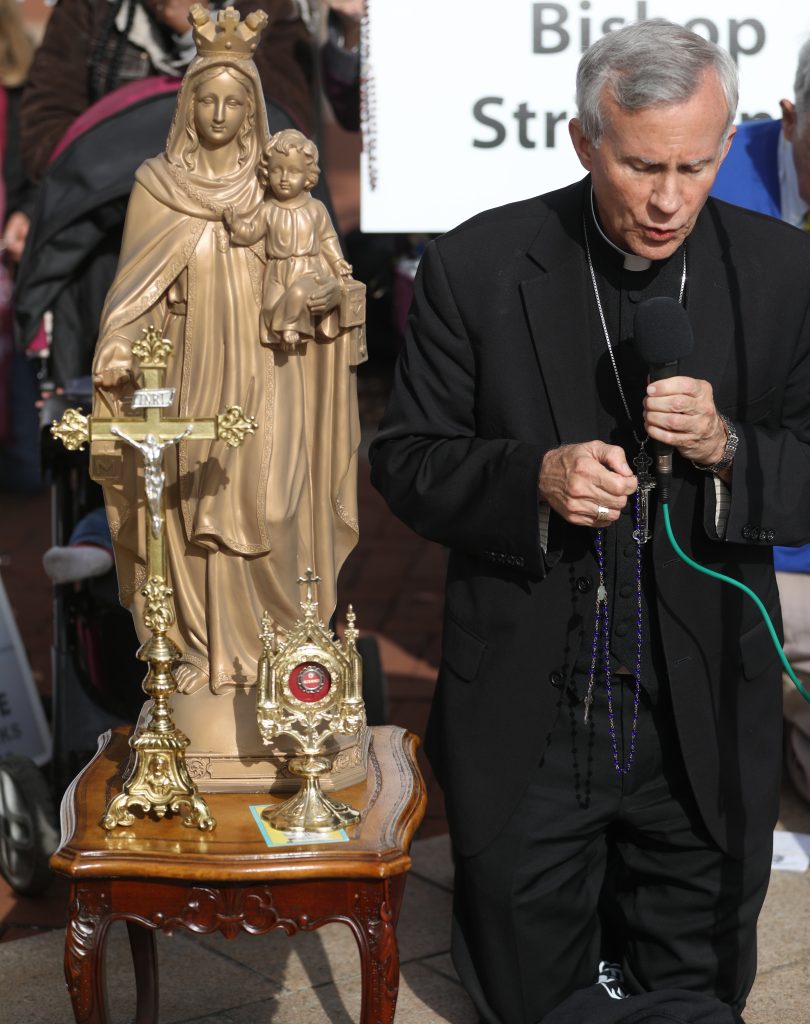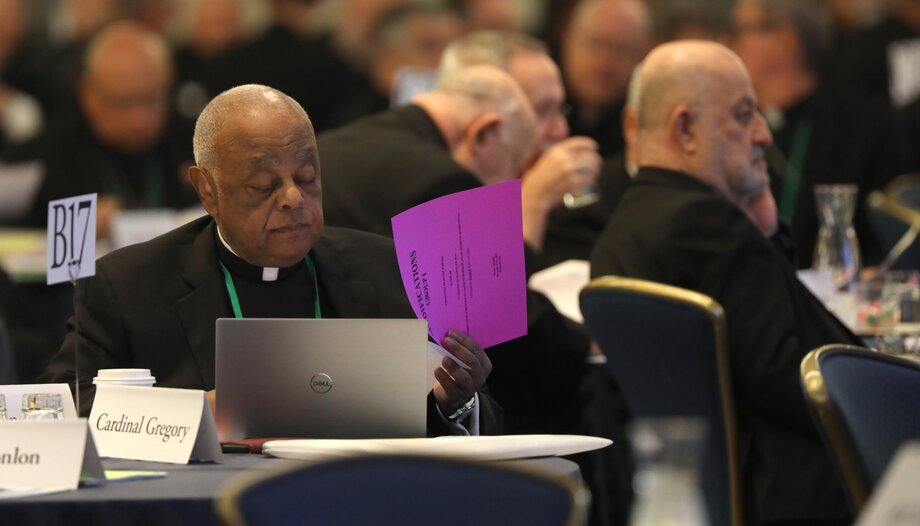The autumn plenary assembly of the United States Conference of Catholic Bishops (USCCB), held this year in Baltimore, did not feature the intense public debates and closely watched leadership elections to which we have become accustomed in recent years.
Instead, the Nov. 13-16 meeting featured the presence of a recently deposed Texas bishop just steps away from the meeting venue, an apparent difference of opinion between the USCCB president and the Pope's ambassador to the U.S., and a surprisingly lively public debate on the Church's role in responding to the mental health crisis.
A bishop dismissed
The case of Bishop Joseph Strickland took a dramatic turn two days before the meeting began, when the Vatican announced that Pope Francis had removed him as bishop of Tyler, Texas, and appointed Bishop Joe Vasquez, of the nearby Diocese of Austin, "apostolic administrator" until a permanent replacement is named.

Strickland has been a leading critic of the pope, especially in his warnings about Francis' alleged lack of clarity on Church teachings related to sexuality and gender. Last May, he accused the pope of "undermining the deposit of faith" in a post on Twitter (now known as X). Days before his ouster, Strickland read a letter describing the pope as "a usurper of the chair of Peter" at a gathering of conservative Catholics in Rome.
The Vatican asked Strickland to resign and, following his refusal, promptly dismissed him on November 11.
But if what happened in Baltimore is a sign of things to come, Strickland, 65, will not go quietly. After the apostolic nuncio, Cardinal Christophe Pierre, the pope's delegate to the United States, asked him not to participate in the bishops' meeting, Strickland traveled to Baltimore anyway with the stated intention of praying in front of the Waterfront Marriott Hotel.
After his final act of prayer before the bishops' hotel, the National Catholic Reporter asked Strickland if he was trying to draw attention to himself.
"It's about Jesus Christ, and his truth must be proclaimed," he replied.
Synodality in America
Although the controversy swirled outside the assembly, Strickland's name was not mentioned as the bishops vigorously pursued a primarily administrative agenda.
In his first address to the bishops since becoming a cardinal in September, Pierre recalled the Gospel account of Jesus' Easter encounter with his disciples on the road to Emmaus to link the Synod on Synodality being held at the Vatican to the initiative of the bishops of the National Eucharistic Revival.
"I believe we will have a true Eucharistic rebirth when we experience the Eucharist as the sacrament of Christ's incarnation: as the Lord walking with us together on the way," Pierre said, echoing the synod's "walking together" motto.
Moments later, the president of the U.S. bishops, Archbishop Timothy Broglio, praised in his opening address "the many synodal realities that already exist in the Church in the United States."
Broglio's speech was interpreted by some as a mild rejoinder to more controversial statements Pierre had made in an "America" magazine feature published days earlier. In the interview, Pierre expressed concern that some U.S. bishops and priests were not fully supportive of the Pope's synod initiatives. In his speech, Broglio thanked "those who infuse vitality, commitment and renewal into our faith communities," and praised U.S. priests "on the front lines" for being "on fire with the Gospel."
Later, at a press conference, he said he had spoken to Pierre about his interview ....
"At the very least, the way "America" magazine characterized Archbishop Pierre's reflections, I don't think it really reflects the Church in America," he said.
A mental health epidemic
Most of the action items at the meeting elicited little or no debate or discussion from the bishops, with one notable exception: the Conference's new "National Catholic Mental Health Campaign."
In the longest public debate of the assembly, nearly 20 bishops rose to address the initiative with input on ways the Church in the U.S. can address the mental health crisis.
Cardinal Daniel DiNardo of Galveston-Houston lamented the shortage of psychiatrists in his archdiocese, and urged the Church to find ways to encourage more young medical students to seek careers in the field.
"The lack of this kind of help is very, very troubling in the United States," he said.
Archbishop Joseph Naumann of Kansas City, Kansas, called attention to the disintegration of family life and the targeting of youth by the pornography industry; Archbishop Gustavo Garcia-Siller of San Antonio was concerned about the relationship of the crisis to the rise in domestic and gun-related violence across the country.
Several bishops spoke of initiatives in their own dioceses to address what they described as a mental health "epidemic," including healing Masses, introduction of therapists in Catholic schools and parish mental health ministries.
2024 on the horizon
Overall, this year's meeting impressed some observers as reflecting the new "synodal" style that the Pope calls for the universal Church, with the bishops devoting more time to prayer and private "fraternal dialogues" than in previous years.
In his public presentation, synod delegate Bishop Daniel Flores of Brownsville, Texas, suggested that the synod's discussion of possible reforms to the Church's leadership structures would have to respect "doctrinal principles."
"The structure alone, of course, cannot ensure a form of Christian life and mission shared and promoted in common; because without the Spirit, the letter is dead," said Flores, who also announced that the synod's "interim report" will be discussed at the next meeting of the bishops in June 2024, before the synod's second session next October.
Meanwhile, the bishops also heard an update on preparations for next year's National Eucharistic Congress in Indianapolis (July 17-21). The main organizer, Bishop Andrew Cozzens of Crookston, Minnesota, emphasized the pilgrimage aspect of the event, which he said is intended to be "a moment of great renewal and great rebirth for our Church" that will "stimulate evangelization" in the United States.
Ultimately, if anything can be gleaned from the bishops' week in Baltimore, it is that the outcomes of moments like the Eucharistic Congress and the concrete steps taken to address crises like the mental health epidemic or the decline of faith and practice in America will tell us far more about the state of the Church in America than the statements of church leaders.
Editor-in-Chief of Angelus. Weekly magazine of the Archdiocese of Los Angeles, California.







